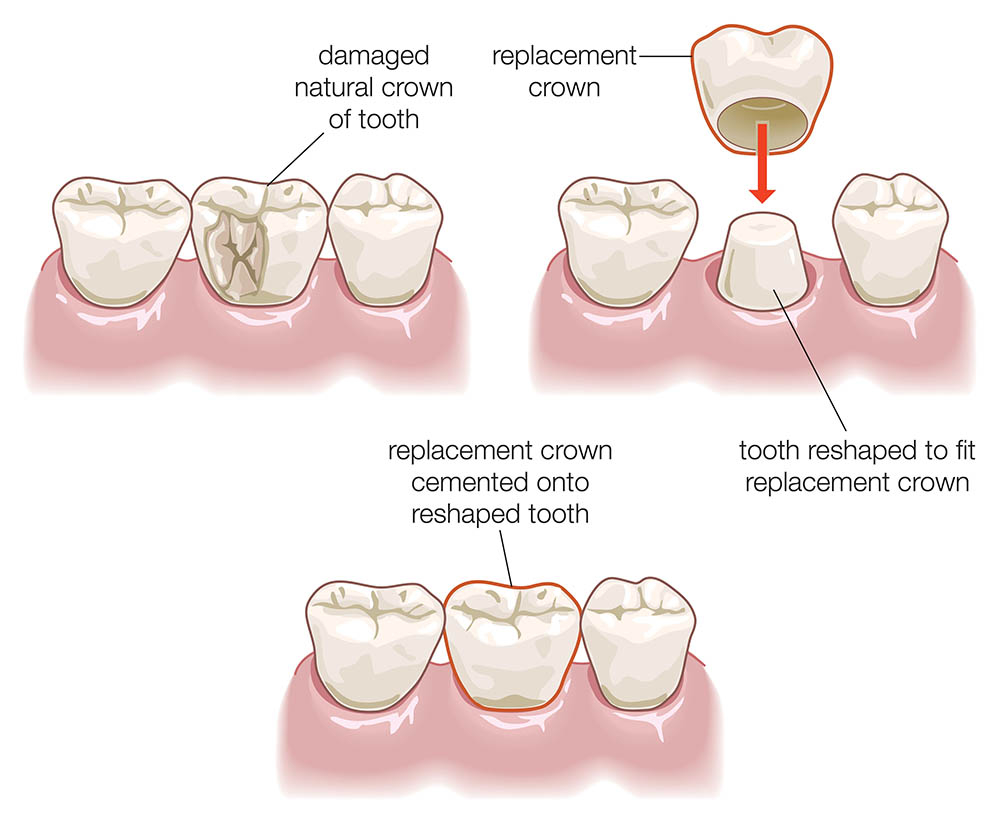Why do I need to get a Crown on my tooth?
A dental crown, also known as a dental cap or tooth crown, is a prosthetic restoration that covers and encases a damaged or weakened tooth. It is designed to restore the shape, size, strength, and appearance of the tooth, providing protection and support.
Steps involved in getting a Dental Crown:
Dental Examination: Dr. Tomar will carefully examine your tooth and determine if a dental crown is the appropriate treatment for your specific needs. They will evaluate the condition of the underlying tooth, consider factors such as decay, cracks, or previous dental treatments (like root canals or deep fillings.)
Tooth Preparation: The tooth receiving the crown will be prepared by removing a portion of its outer structure. This creates space for the crown to fit over the remaining tooth seamlessly and makes the visual outcome similar to your other healthy teeth. Local anesthesia may be administered to ensure comfort during the procedure.
Impression: Once the tooth is prepared, we will take an impression of the tooth and the surrounding teeth using our iTero 5D (5 dimensional) digital scanner. This impression serves as a digital mold for the dental lab to create a custom-made crown that fits precisely over your tooth.
Temporary Crown: In most cases, a temporary crown will be placed over the prepared tooth to protect it while the permanent crown is being fabricated. The temporary crown immediately fills in the space around your tooth being treated – leading to a appealing visual outcome.
Crown Fabrication: Our dental lab will use the digital impression to fabricate your custom-made dental crown. This process may take a couple of weeks. We will work with you select an appropriate shade to match the color of your natural teeth.
Crown Placement: Once the permanent crown is ready, you will return to our office for the final crown placement. The temporary crown, if present, will be removed, and the fit and appearance of the permanent crown will be evaluated. Once approved, the crown will be permanently cemented or bonded onto the prepared tooth.
Bite Adjustment: Dr Tomar will ensure that your bite is comfortable and aligned properly with the crown. Minor adjustments may be made to ensure a harmonious bite.
Oral Hygiene and Maintenance: After crown placement, follow the precautions and oral hygiene practices mentioned earlier to maintain the health of your crowned tooth and surrounding tissues.

What precautions do I need to take before and after getting my Dental Crown?
Precautions before getting a Dental Crown:
- Discuss Expectations: Communicate your concerns and expectations with Dr. Tomar. Discuss the type of crown material, color, and appearance you desire, as well as any specific concerns you may have.
Oral Health: Maintain good oral hygiene by brushing your teeth twice a day and flossing regularly. If necessary, address any existing dental issues, such as gum disease or cavities, before getting a dental crown.
Precautions after getting a Dental Crown:
Numbness: If local anesthesia was used during the crown placement procedure, be cautious when eating or drinking until the numbness wears off completely. This will prevent accidentally biting or burning your tongue, lips, or cheek.
Sensitivity: It is normal to experience some sensitivity to temperature changes, particularly in the days following crown placement. This sensitivity should subside within a few weeks as the tooth and surrounding tissues adapt. If the sensitivity persists or worsens, contact our office.
Oral Hygiene: Proper oral hygiene is crucial to maintain the health of your crowned tooth and surrounding gum tissue. Brush your teeth gently twice a day, paying attention to the area around the crown. Use a soft-bristled toothbrush and non-abrasive toothpaste. Floss daily, being careful around the crown to prevent dislodging or damaging it. Consider using an antibacterial mouthwash to maintain oral hygiene.
Avoid Hard Foods: Avoid chewing on hard objects or biting down on extremely hard foods, as this can potentially damage the crown. Examples include ice, hard candies, or opening packages with your teeth. If you habitually grind or clench your teeth, inform your doctor, as a nightguard (occlusal guard) may be recommended to protect the crown.
Regular Dental Check-ups: Maintain regular dental check-ups and cleanings to ensure the longevity and proper maintenance of your dental crown. We will assess the fit, integrity, and overall oral health, and address any concerns you may have.
What happens after I get my Dental Crown?
You can generally eat normally after getting a dental crown. Dental crowns are designed to be strong and durable, allowing you to bite and chew most types of food without any issues. However, it’s important to keep a few considerations in mind:
Temporary Crown: If you have a temporary crown while waiting for your permanent crown to be made, it’s important to exercise some caution. Temporary crowns are not as strong as permanent crowns and may be more prone to damage. Avoid sticky or hard foods that could dislodge or break the temporary crown.
Sensitivity: It’s common to experience some sensitivity to hot or cold temperatures in the days following crown placement. This sensitivity should subside gradually. If the sensitivity persists or worsens over time, it’s advisable to consult your dentist.
Proper Chewing Technique: While dental crowns are designed to be strong, it’s still a good idea to be mindful of your chewing technique, especially immediately after getting a crown. Chew evenly on both sides of your mouth and avoid biting down on hard objects like ice or using your teeth as tools to open packages. These actions can potentially damage the crown or put excess stress on the underlying tooth.
Oral Hygiene: Maintain good oral hygiene practices to keep your crowned tooth and the surrounding gums healthy. Brush your teeth gently twice a day, paying attention to the area around the crown. Use a soft-bristled toothbrush and non-abrasive toothpaste. Floss daily, being careful around the crown to avoid dislodging it.
Regular Dental Check-ups: Continue to visit us for regular check-ups and cleanings. The doctor will assess the condition of your crown, check the fit, and make any necessary adjustments if needed.
While dental crowns are quite resilient, it’s important to note that they are not indestructible. If you experience any discomfort, looseness, or damage to your crown while eating, it’s recommended to contact our office for an evaluation and appropriate treatment. By following good oral hygiene practices and maintaining regular dental care, you can enjoy normal eating habits with your dental crown.



